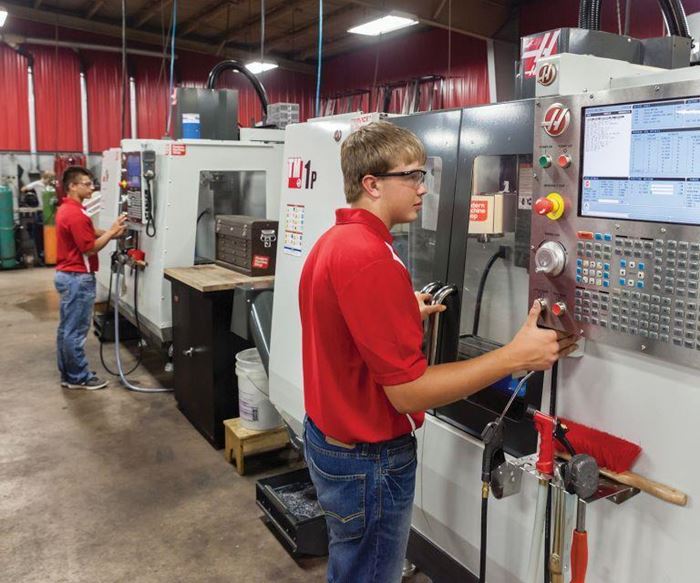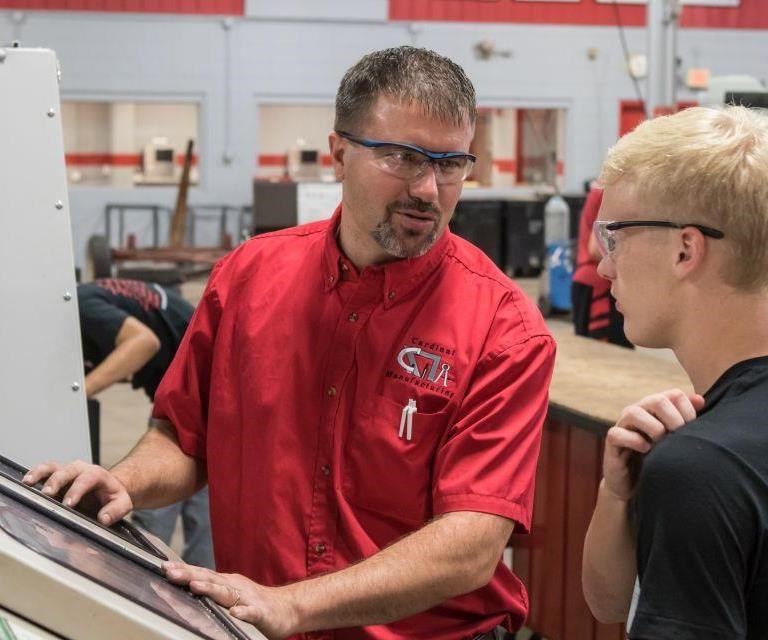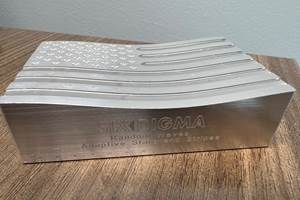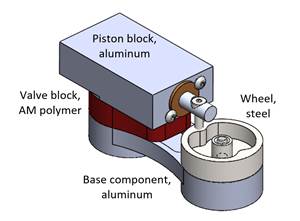Q&A with Cardinal Manufacturing
A Wisconsin high school manufacturing class funds itself by operating as a business. The program provides a model for other school systems seeking to advance manufacturing instruction. Leaders in one Ohio county recently explored this idea.
Share





In western Wisconsin, the Eleva-Strum public school district has an answer to the so-called “skills gap.” In fact, this school district has one of the most enriching answers I have seen, because its solution elevates not only students’ manufacturing skills, but also foundational skills related to employment and professionalism. This district is the location of “Cardinal Manufacturing,” the Eleva-Strum High School manufacturing class that operates as a commercial business—operates, in fact, as a job shop. The students in this class earn money for the program itself by making machined and welded parts for other businesses. Profits from this work have provided for modern CNC equipment and other advanced resources that would otherwise be inconceivable for a high school shop class in such a small district. The same income also provides for profit-sharing checks for the students at the end of the school year, up to about $1,500 for the student who last year clocked the most time at work in the student shop.
Modern Machine Shop has covered Cardinal Manufacturing various times. The school’s model is still the same as when we detailed the program in this article. Since then, about six other high schools, in Wisconsin and outside the state, have launched or intend to launch similar student-run manufacturing businesses. Craig Cegielski, Cardinal Manufacturing’s founder and teacher, has advised most of these, and he says he hopes one day to get to see a student-run high school manufacturing business in each of the 50 states.
Ohio is among the latest states to show interest. In northeast Ohio, the Medina County Economic Development Corporation recently hosted Mr. Cegielski in a closed roundtable discussion in which local educators at both the high school and college level, as well as business leaders and a state representative, all had the chance to ask the Wisconsin teacher sometimes blunt questions about his program.
I had the chance to join the discussion. Each of the 18 local leaders involved saw significant promise and value in this program for both students and manufacturers in the county. But many of them also perceived obstacles to implementing such a program that they wanted the teacher to speak to. For communities that might consider promoting manufacturing education through a program like this, the exchange brought out some of the concerns and operational details. Here are some of the questions asked and my summaries of Mr. Cegielski’s responses:
Q: Where did the initial capital come from to begin this program?
Mr. Cegielski responds, essentially, “What capital?” School leaders and administrators supported him in this plan to reinvigorate the school’s manufacturing program, but they could not afford a large up-front investment in an uncertain idea. Thus, the program was launched in 2005 with an initial budget of $3,000.
At that time, the shop class had only old equipment. The business began with the students doing what commercial work they could on these machines—generally low-tolerance repair work for local companies, including local farmers—with profits reinvested into the shop. Student projects in those early days also served the needs of the shop. For example, students built welding bays and workbenches that later classes of students continue to use.
The shop has continued to grow and improve in this way, but the teacher says progress has not been as slow as one might imagine. Along with the equipment being purchased, some equipment has been donated by businesses seeing the shop’s success and wanting to encourage it. A local machine shop, MRS Machining, has been generous in donating equipment, for example. And among the shop’s newest equipment is two Haas Automation CNC vertical machining centers. One of these was purchased outright by Cardinal Manufacturing and one was donated by Haas.
Q: What did the early conversations look like with local businesses?
During the summer before the program launched, Mr. Cegielski devoted a week to doing nothing except visiting every local industrial business he could to explain what he planned to do. He did not ask for donations in these meeting; he asked for work. Some initial orders to the student-run business came out of those conversations. Students’ successful delivery of those orders led to more work, and more customers by word-of-mouth. The high school company has not lacked for work since then, and Mr. Cegielski has not had to do any cold calling after that one summer week.
Q: Are there liability implications of students doing commercial work?
Some of Cardinal Manufacturing’s work is repair, including one noteworthy job that involved significant remanufacturing related to a piece of agricultural equipment. One roundtable participant therefore asked about liability. What if the remanufactured component later fails in a way that causes injury or damage?
Mr. Cegielski says the superintendent and other leaders of the Eleva-Strum district took care to have the district’s insurance company review their plans to launch the Cardinal Manufacturing program. They obtained the assurance that the district’s coverage does address a circumstance like the one described above.
Similarly, the possibility of a student being injured while doing commercial work at the school (which hopefully never occurs) is covered by insurance as well. Though the students here happen to be using the school equipment to make useful parts for customers rather than traditional shop-class assignments, the work is equally risky in either case, and it looks the same from the insurance company’s perspective.
Q: Eleva-Strum High School is small. How could this idea work in a large school?
Eleva-Strum’s most recent graduating class was 43. As an indicator of how popular manufacturing has become, 18 of those former seniors were in Cardinal Manufacturing. (Whereas the shop class a decade or so ago attracted more like six.) For the effectiveness of this program as a functioning business, Mr. Cegielski has to limit the class’s size, yet in such a small school, even being selective still lets him admit a large share of total students. How could such a program work in a school that is much larger?
Mr. Cegielski says the crucial element of this model is “student-run business.” In a large school, the answer would be to extend that model beyond manufacturing. Yes, there certainly would be too many interested students if manufacturing was the only student-run business available, so the key to scaling up would be to add more student-run businesses. What about a student-run nursery in the school greenhouse? Or a student-run auto repair shop, or catering business?
Q: Who receives the money and cuts the checks? Does the student-run business have its own finances?
Yes and no, Mr. Cegielski says. Customers make payments to the school district. The district maintains funds and disburses them on Cardinal Manufacturing’s behalf. Financially, the business functions like a student club. The shop has recently been given the use of a credit card, he says, a change that has made this arrangement much more seamless.
Q: Is there enough work to go around? Is there a danger of the student-run business competing against local businesses?
There is plenty of work, the teacher says. Local manufacturers often send Cardinal the short-run, low-tolerance work they don’t want to bother with—a win for both parties.
In addition, Cardinal’s low prices actually create work. The low hourly rate it charges for student labor means it frequently obtains the chance to perform repairs on components that the owner otherwise would discard.
Q: What does the instructor’s day look like?
Only half-jokingly, Mr. Cegielski says his role with Cardinal Manufacturing is to “stand around and do nothing.” He trains students in how to perform every aspect of the business, including not just programming and running jobs but also scheduling and billing, in the hope that they actually can perform every aspect—leaving him to supervise.
But Cardinal Manufacturing as a class officially occupies only two periods of an eight-period day. He teaches other classes during other periods. Cardinal Manufacturing students meanwhile often spend study hall periods continuing their work in the shop. The teacher’s classroom includes large windows into the shop so he can see this activity.
Q: What has your time with Cardinal Manufacturing taught you?
“I’m teaching soft skills,” says Mr. Cegielski. That is a far bigger and more significant part of what he is imparting to students than he could have appreciated when he began this program. Over time, he has adapted his plan for the class to emphasize this instruction, which starts on the first day of school each year. “On day one, I teach everyone how to shake hands,” he says.
Similarly, whenever a customer visits to pick up a finished job, he turns this into an opportunity to practice professionalism and customer service. He has the students plan: Who will greet the customer and give him his parts? Who will help load them? Who will have the invoice ready? Who will thank him for his business?
There is also financial counseling, he says. The involvement in commercial work gives him a chance to discuss with students how valuable it is to possess a marketable trade, in the context of how much it costs to live as an adult and how much they should therefore be aiming to earn.
Every different year delivers a different group of kids. The mix of what they need from him varies, he says. “But there have been years when developing soft skills accounted for 25 percent of what we spent our time on.”
Related Content
How to Pass the Job Interview as an Employer
Job interviews are a two-way street. Follow these tips to make a good impression on your potential future workforce.
Read MoreManufacturing Madness: Colleges Vie for Machining Title (Includes Video)
The first annual SEC Machining Competition highlighted students studying for careers in machining, as well as the need to rebuild a domestic manufacturing workforce.
Read MoreBuilding Machines and Apprenticeships In-House: 5-Axis Live
Universal machines were the main draw of Grob’s 5-Axis Live — though the company’s apprenticeship and support proved equally impressive.
Read MoreSolve Worker Shortages With ACE Workforce Development
The America’s Cutting Edge (ACE) program is addressing the current shortage in trained and available workers by offering no-cost online and in-person training opportunities in CNC machining and metrology.
Read MoreRead Next
5 Rules of Thumb for Buying CNC Machine Tools
Use these tips to carefully plan your machine tool purchases and to avoid regretting your decision later.
Read MoreRegistration Now Open for the Precision Machining Technology Show (PMTS) 2025
The precision machining industry’s premier event returns to Cleveland, OH, April 1-3.
Read MoreBuilding Out a Foundation for Student Machinists
Autodesk and Haas have teamed up to produce an introductory course for students that covers the basics of CAD, CAM and CNC while providing them with a portfolio part.
Read More





























.jpg;maxWidth=300;quality=90)







